- Home
- Heather Graham
When We Touch Page 6
When We Touch Read online
Page 6
The more children they had, the more desperate, naturally, the women became.
And the more orphans who appeared, abandoned on the steps of the church.
She had learned that she had a gift for speaking, a way of making her audience laugh, and in laughing, comprehend. That day, she spoke about abstinence and timing, and condoms.
“Dearie, we can’t be payin’ for the condoms!” a toothless woman called to her. “Goat’s bladders, did ye say? ’At’s wot they make ’em from?”
“The important issue is that we prevent pregnancy.”
“Why, ’alf the guvners I know are used to sheep as well, Katy!” another woman called to the first.
Maggie looked down, shaking her head. “Spend a few pennies less on gin, and you’ll have what you need. Not to mention the fact that Father Vickers and I have acquired some free . . . contraceptives for you.”
“Oh, m’lady!” cried a woman called Bess. “’Ow do we get our blokes to use ’em?”
“Insist,” Maggie said.
“ ’T’won’t be easy!” Katy said. “Why, Lordy! I never heard ’ow such a thing meself until this very day!”
“Believe me, they’ve been around for . . . well, for a very, very long time.”
Bess sniggered. “Wot if they don’t know ’ow to get ’em on!”
“Between you, you’ll figure it out,” she said dryly. “And neither is feeding more children an easy effort. Abortions can be deadly—especially those you try to bring upon yourselves, or those performed by many a supposed physician in these quarters,” she reminded them sharply. “Now, really! I’m certain most of you all are well aware of methods of prevention, and condoms—in some form or another—have been in use for more than a thousand years.”
She went on to talk about emptying chamber pots more frequently, and speak about the virtue—and good health—to be found in a modicum of cleanliness, though she knew that soap, as well, was a luxury these women could not afford. But though she had secured the condoms with what had been left of her own allowance, she had gotten Charles to provide the soap to be given away that day. She realized a little uneasily that she hadn’t told him a thing about her speech, and certainly hadn’t discussed condoms with him. It had been a Herculean task to bring the conversation regarding “precaution” to Father Vickers, but he, at least, during his time in the area, was aware that although such a discussion was a ghastly sin in a social arena, it made the utmost sense in the East End. She wasn’t sure which one of them had blushed more when they had first determined on the effort.
God told Adam to go out and be fruitful, but certainly, the “fruit” of the East End usually perished before it became anywhere near ripe.
“Thank you all for listening to me,” she said, finishing her speech. Nathan had once told her that what the poor often needed more than anything was simple respect. And so, she always thanked her audience, were they toothless, penniless, or even flat-out drunk with gin, lolling on the ground before her.
The women rushed toward her, thanking her, touching her. To this day, she had to grit her teeth to endure the stench and the creeping sensation that sometimes touched her flesh. But endure she did.
And when they began to filter away, eager for their handouts given to them by employed members of the parish, she walked back toward the side door of the church, where she knew that Mireau and Father Vickers would be waiting, watching, as they always did, when she spoke. Father Vickers always saw to it that some of the local police were about as well, for her protection, if need be. They came, she knew, even when they were off duty. She had been the wife of one of their own.
Yet that day, as she walked toward her friend and the good reverend, she was startled to see that a third man was with them.
Dismay filled her.
It was none other than Sir James.
He stood with his arms crossed over his chest, a greatcoat concealing whatever manner of dress he wore beneath, a deerstalker hat adding to his impression of dominant height. His eyes—an ever-changing gray, she now knew—were narrowed. Disapproving? No, out-and-out condemning.
Her heart fluttered.
What? Had he appointed himself her watchdog? Naturally, he would report her every movement to Charles. He was spying on her!
That last gave her the impetus to brave out the situation. Yet even as she mentally squared her shoulders and lengthened the determination of her steps, she felt weak in the knees, and knew that a flush was coming to her cheeks. Good God, the man had been listening to her talk about condoms!
“Sir James. What a surprise to see you here,” she said flatly.
He arched a brow, his mouth grim. And not a pleasant surprise at all, he seemed to imply in silence.
Aloud, he said, “You’re quite an amazement, my lady. Your knowledge and occupations seem to be limitless.”
She waved a hand in the air. “Sir Charles is very aware of the depth of the problems we face in society.” She longed to bite her lip. She owed him no explanations.
“Perhaps you won’t mind my seeing that you are out of the area safely. Father Vickers has been adding to my awareness of the dangers to be found here. If simple cutthroats, rapists, and thieves were not enough, it seems there may well be a madman on the loose.”
“I come here frequently. You might notice the number of policemen about.”
“Yes, and despite that number, you are surely more aware than most that murder occurs here with an appalling frequency,” he said.
“Seriously, Sir James,” Mireau tried, “the police have a special interest in Maggie.”
“Yes,” he returned to Mireau, his eyes remaining hard upon Maggie’s, “and still, it would comfort me greatly to see you both back to Mayfair.”
“My dear lady, it cannot hurt to have another strong protector at your side,” Father Vickers said nervously.
“I’m always quite willing to protect Maggie!” Mireau said, a trifle indignant. But he was aware, of course, that he was lean himself. Not quite skinny, of course, but lean. Sir Jamie was assessing him and they all knew it. And again, Maggie thought, his look was definitely one of skepticism, if not his usual gaze of contempt.
“As Father Vickers said, it doesn’t hurt for a lady to have a second protector in this area. Father, it’s been a delight to make your acquaintance,” Jamie said, and offered an arm to Maggie. “Shall we? Unless you’ve further business here. I’m more than willing to wait, if need be.”
“No, no, we’re done for the day,” Mireau said.
“Good-bye, Father. I’ll see you in another two weeks,” Maggie said.
“Perhaps you’ll need to reschedule. You’ll be on your honeymoon,” Jamie reminded her. “And I’m sure that the church and the Salvation Army will understand your eagerness to spend special time with your new husband.”
She wondered how anyone could make such innocuous words sound so . . . sexual.
“I’ll get word to you,” she said sweetly to Father Vickers.
Jamie had a firm grip on her elbow. They moved beyond the enclosure and out to the street where Darby was waiting with a Langdon carriage. She wasn’t sure if she was helped in or shoved in. Mireau quickly followed, and Jamie after him.
She faced Jamie.
“Interesting speech,” he said.
“A necessary speech,” she returned.
“Hardly the usual Friday afternoon for a lady,” he commented.
“I’m sorry if you don’t approve,” she returned.
She was startled by his reply. “I didn’t say that I didn’t approve. I found your words to the poor creatures to be practical in the extreme.”
There were shadows in the carriage. She couldn’t tell if he was speaking truthfully or not.
She looked out the window.
“I’m not terribly sure that Charles would be happy if you were to introduce his daughter to this particular aspect of good works,” Jamie said.
“What I do here is my choice, and my volition, thou
gh I’d not suggest it for anyone else, and certainly not Lord Charles’s daughter. And is she not returning to her school in France after the wedding?” Maggie said.
“She will come of age shortly and intends to spend time in London. Lord Charles is anxious to see her wed.” He glanced away. “He has certain definite intentions for her, and therefore, he wishes to see her remain in England.”
Certain intentions? Maggie wondered if, despite the fact that they were second cousins once removed, Charles didn’t intend to marry his daughter to his brother’s grandson. She wasn’t sure just what the religious and civil laws were now on such an association, but the royal family had been known to allow marriages with much closer associations.
She turned away, watching as the carriage brought them from the underbelly of London slowly back to the world of the living. As she looked out the window, Maggie marveled anew that the streets could go from such seediness and poverty to respectability and even opulence so quickly. It really wasn’t far at all. And yet, there was a world of difference.
The great walls of the Tower rose before them. Soon, they’d be back.
She stared at Jamie Langdon again. “Don’t worry. I wouldn’t dream of bringing Arianna here.”
“She never suggested that I should come with her,” Mireau offered, as always, trying to keep the situation calm. “I’m happy to accompany her. Then again, I knew the area. I came often with Nathan, her husband . . . her late husband. Well, you know, Dickens loved to come down here. Naturally, you can see it in his writing. There’s so much grist for the mill, you know. And actually, once the area thrived. The Flemish weavers who moved here created the finest cloth imaginable. The world has taken such a turn with industry and science! Things change . . . and sometimes, they get worse. Well, maybe it seems that they often get worse. But the problem is, really, even with great writers like Dickens telling the world about the East End, no one really wants to see. Or if they see, they don’t know what to do. But every little bit helps, of course.”
Mireau suddenly seemed to realize that he was babbling. They were both just staring at him. “Well, you know, the little bit that Maggie can do helps tremendously. All right, so no one person could really end the poverty for the tens of thousands living in such squalor, but . . . and, of course, a lot of it is because immigration is so very heavy, and jobs can be scarce, and many people don’t want to employ foreigners when there are so many English out of work . . . well . . . you know, the thing of it is, there are families in the East End, and there are legitimate shops and many people there try desperately hard to make an income. Sadly, the English way out of a problem is often a gin bottle. And you mix alcohol with ignorance and desperation, and naturally, you have burglary, violence, rape . . . murder. Of course, today, Father Vickers was speaking about something entirely different. Something truly horrible beyond conception. Surely, of course, such a madman will be apprehended. Though he was telling me more about it when you were speaking, Maggie. They’re not sure if this recent murder is associated with two others that occurred not long ago. Nothing, however, has been this horrid, this . . . this insane! And he’s right, of course. Should anyone of wealth ever be killed with such savagery, such butchery . . .”
He broke off suddenly, realizing that he wasn’t helping Maggie’s position at all.
“Did you do this while your husband was alive?” Jamie asked her pointedly.
“No,” she admitted stiffly.
“Um,” he murmured.
“And what does that mean?” she demanded.
“It means that he’d have kept you from coming here.”
“Why on earth would he do so? He was a great champion of the poor!” Maggie said indignantly.
“And a policeman, one who knew that the wandering around of a lady such as yourself could well stir resentments and anger, and bring about catastrophe,” Jamie said.
“I know what I’m doing,” she informed him.
“It’s really none of my affair,” Jamie said.
“There, that’s right!” Mireau burst in, well aware that both of their voices were growing more tense. “Every man and woman, noble and common, must draw their own paths, look at the world around them, choose courses and forks in the road! Maggie has chosen to take a few risks. Of course, this is just the half of it! She’s really quite remarkable, you know.”
“Jacques!” Maggie said quietly.
“Oh, yes, quite remarkable,” Jamie agreed.
She looked out the window again. Mireau remained uncomfortably silent. “Ah!” he said at last. “The house is coming up!”
They stopped. Mireau jumped out of the cab before Darby could come around. “Thank you, old chap. The carriage was a far better ride than trying to flag down a cabbie in the East End. Why, the one earlier was quite a bad bargain, the grisly old fellow asking way more than he should have for such a ride, and the poor horse appearing as if it hadn’t had a drink in quite some time.”
Maggie started to move toward the door.
“I think we should take a ride alone, don’t you?” Jamie said.
She froze in a rather uncomfortable position, sliding over to exit the carriage. She stared at him. “Should we?” she managed at last, straightening and looking at him. “Why on earth should we do so?”
“To clear the air?” he suggested politely.
“I don’t think the air can be cleared,” she told him flatly.
He reached over, swinging the carriage door closed, and the smile he gave her was grim. “Let’s try.”
He tapped on the carriage roof with his knuckles, but then leaned out. “Back in a bit, Mireau,” he said pleasantly. Apparently, Darby had already retaken his seat; the carriage rolled into action with the smallest of jolts.
Maggie sat back irritably. “And just where are we going?”
“Not far. Let’s speak honestly and quickly.”
“Please, go right ahead.”
“You’re marrying Charles for his money.”
“What an insult to a man to whom you claim such fidelity!”
He sat back. “Apparently, it’s going to be a long ride.”
“What in God’s name do you want from me?” she demanded.
“Let’s see; you were hesitant, but Charles came to your house, you took one look at him and fell madly in love, as reportedly you did with your first husband.”
“Only husband thus far,” she reminded him icily.
“Ah, so are you saying that you did meet Charles and suddenly fell into a passionate fit of love and desire?”
“I saw Charles, and remembered him. And remembered that he was always kind, intelligent, and dear on those occasions when I had seen him before.”
He leaned forward, uncomfortably close now in the tight confines of the carriage. “You didn’t think, aha! but he has aged . . . surely he cannot have many years left in him?”
“You are crass and disgusting—and all regarding a man you pretend to serve with love.”
“I serve no one. I stand behind Charles because he is my kin, my elder, and an exceptional man. I’m being honest and practical. I’ve seen you give speeches and I can hardly imagine that I’m shocking you.”
“Perhaps I don’t care to accept such impropriety from you,” she said.
That drew another of his humorless smiles. “As you wish. Still, I’m afraid you’re going to have to listen to me.”
She lifted her hands with dismay. “It seems I am a captive audience.”
“All right, then. It’s obvious that you are marrying the man for his position, and most importantly, money. A marriage of convenience. Your convenience.”
She smiled as well. “Sir, many a marriage is a matter of convenience. This marriage was arranged. At the very beginning, I was not consulted. Such remains the lot of many a woman who would be a wife.”
“Ah, but I do know your brother, lady. And for all his faults, he is not a fellow who would force his sister to anything against her will. And we are not livin
g in medieval times. This is the nineteenth century.”
“And you suggest that marriages are not arranged?”
“I am suggesting that had you protested the obvious incongruity of this, it would not have come about.”
“You know, I believe that I will tell your uncle about this conversation,” she informed him.
“Be my guest. But we’ve not come to the end of it.”
“As far as I’m concerned, we have.”
“You remain a captive audience,” he reminded her. And indeed, she did. The carriage, spacious enough, seemed smaller than ever. He dominated whatever space he occupied, and that was it. He was simply dressed that day, his trousers and waistcoat pressed black, his cravat a silver gray, and his caped greatcoat equally as dark. Perhaps it was the cut and style of the coat itself; his shoulders seemed to stretch the breadth of the carriage. But were he slender, he might have seemed to consume the space as well, for his eyes seemed to be a burning silver that spoke volumes and echoed and resounded with warning. She denied the shiver that rent through her, and wished that her gaze did not fall to his hands resting on the silver-handled walking stick he carried. They were powerful hands, neatly groomed, but his fingers were long and tense, and the size of his hands, like that of his shoulders, seemed ridiculously emphasized by the space between them. She loathed the man, and yet he seemed to awake something within her. As he ridiculed and she hated, she still found herself wondering with a wicked fascination just how those hands would feel on her flesh, what it would be like to have those fingers, gentle with tenderness rather than rigid with strength, trailing down her cheek, stroking her shoulder....

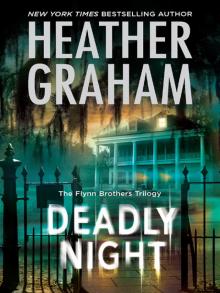 Deadly Night
Deadly Night The Uninvited
The Uninvited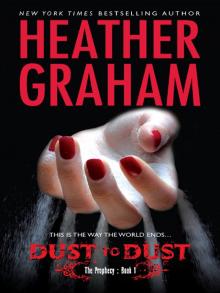 Dust to Dust
Dust to Dust Heart of Evil
Heart of Evil A Perfect Obsession
A Perfect Obsession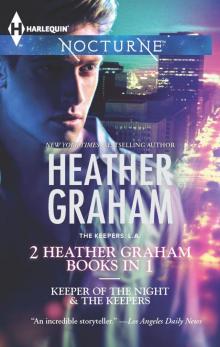 The Keepers
The Keepers Pale as Death
Pale as Death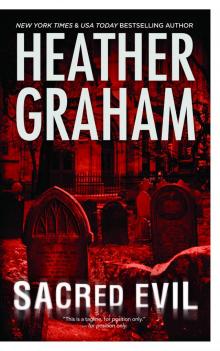 Phantom Evil
Phantom Evil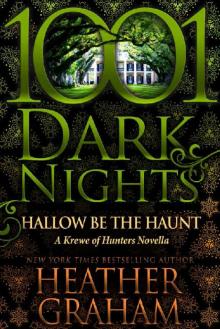 Hallow Be the Haunt
Hallow Be the Haunt Night of the Wolves
Night of the Wolves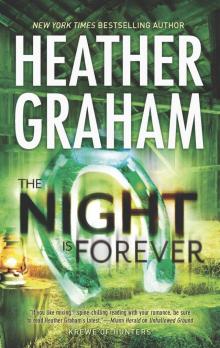 The Night Is Forever
The Night Is Forever Golden Surrender
Golden Surrender Kiss of Darkness
Kiss of Darkness Beneath a Blood Red Moon
Beneath a Blood Red Moon A Dangerous Game
A Dangerous Game Ghost Shadow
Ghost Shadow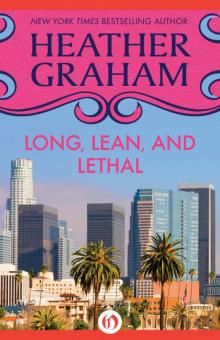 Long, Lean, and Lethal
Long, Lean, and Lethal Fade to Black
Fade to Black The Rising
The Rising And One Wore Gray
And One Wore Gray Rebel
Rebel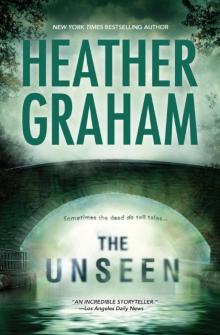 The Unseen
The Unseen The Night Is Watching
The Night Is Watching The Evil Inside
The Evil Inside The Unspoken
The Unspoken The Night Is Alive
The Night Is Alive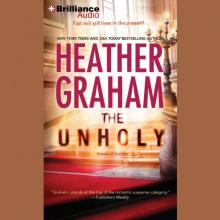 The Unholy
The Unholy Nightwalker
Nightwalker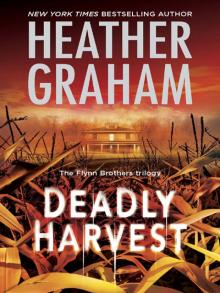 Deadly Harvest
Deadly Harvest An Angel for Christmas
An Angel for Christmas A Pirate's Pleasure
A Pirate's Pleasure American Drifter
American Drifter Realm of Shadows
Realm of Shadows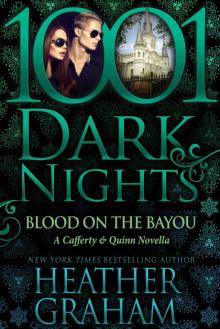 Blood on the Bayou
Blood on the Bayou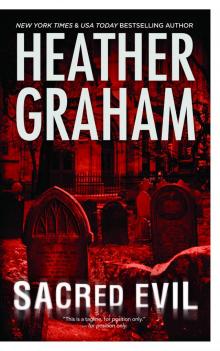 Sacred Evil
Sacred Evil Dying to Have Her
Dying to Have Her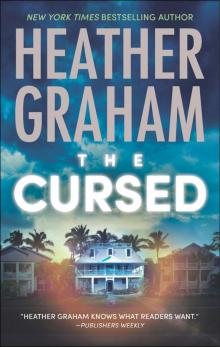 The Cursed
The Cursed Captive
Captive Hurricane Bay
Hurricane Bay Drop Dead Gorgeous
Drop Dead Gorgeous Ghost Memories
Ghost Memories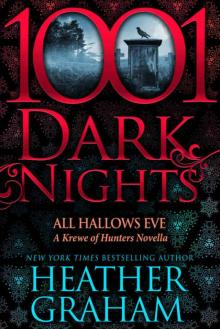 All Hallows Eve
All Hallows Eve Dying Breath
Dying Breath Deadly Fate
Deadly Fate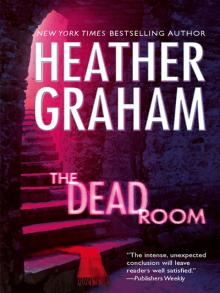 The Dead Room
The Dead Room Lord of the Wolves
Lord of the Wolves Ghost Night
Ghost Night Ghost Walk
Ghost Walk The Forgotten
The Forgotten Unhallowed Ground
Unhallowed Ground One Wore Blue
One Wore Blue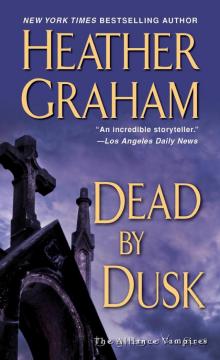 Dead By Dusk
Dead By Dusk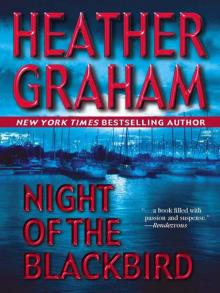 Night of the Blackbird
Night of the Blackbird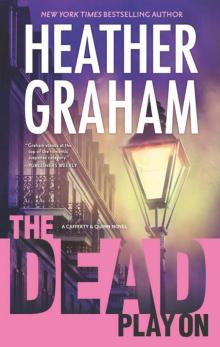 The Dead Play On
The Dead Play On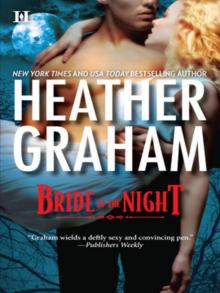 Bride of the Night
Bride of the Night Wicked Deeds
Wicked Deeds The Forbidden
The Forbidden Triumph
Triumph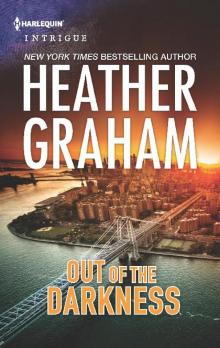 Out of the Darkness
Out of the Darkness Love Not a Rebel
Love Not a Rebel The Last Noel
The Last Noel Tall, Dark, and Deadly
Tall, Dark, and Deadly The Death Dealer
The Death Dealer Dead on the Dance Floor
Dead on the Dance Floor Law and Disorder
Law and Disorder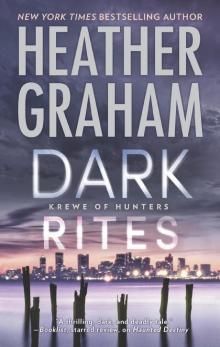 Dark Rites
Dark Rites New Year's Eve
New Year's Eve Hostage At Crystal Manor
Hostage At Crystal Manor And One Rode West
And One Rode West Home in Time for Christmas
Home in Time for Christmas Killing Kelly
Killing Kelly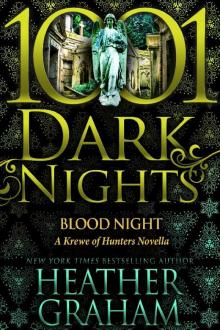 Blood Night
Blood Night Tangled Threat (Mills & Boon Heroes)
Tangled Threat (Mills & Boon Heroes) Darkest Journey
Darkest Journey Glory
Glory Deadly Touch
Deadly Touch An Unexpected Guest
An Unexpected Guest Night of the Vampires
Night of the Vampires Seize the Wind
Seize the Wind Ghost Moon
Ghost Moon The Vision
The Vision Dreaming Death
Dreaming Death Conspiracy to Murder
Conspiracy to Murder Horror-Ween (Krewe of Hunters)
Horror-Ween (Krewe of Hunters)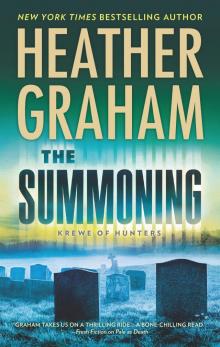 The Summoning
The Summoning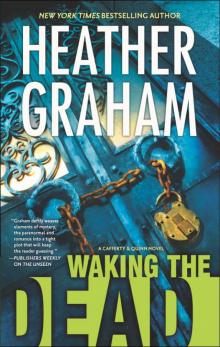 Waking the Dead
Waking the Dead Danger in Numbers
Danger in Numbers The Hidden
The Hidden Sweet Savage Eden
Sweet Savage Eden Tangled Threat ; Suspicious
Tangled Threat ; Suspicious Mother's Day, the Krewe, and a Really Big Dog
Mother's Day, the Krewe, and a Really Big Dog Picture Me Dead
Picture Me Dead The Killing Edge
The Killing Edge St. Patrick's Day
St. Patrick's Day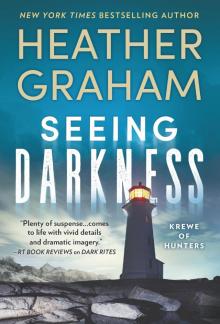 Seeing Darkness
Seeing Darkness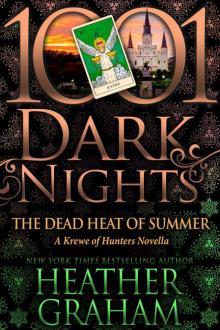 The Dead Heat of Summer: A Krewe of Hunters Novella
The Dead Heat of Summer: A Krewe of Hunters Novella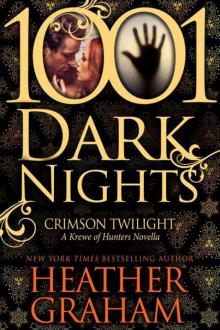 Crimson Twilight
Crimson Twilight Haunted Destiny
Haunted Destiny Devil's Mistress
Devil's Mistress Banshee
Banshee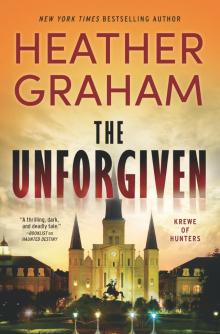 The Unforgiven
The Unforgiven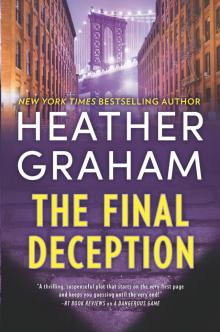 The Final Deception
The Final Deception A Horribly Haunted Halloween
A Horribly Haunted Halloween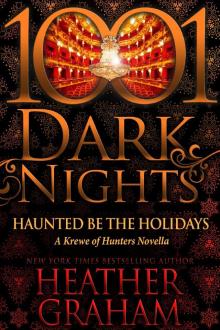 Haunted Be the Holidays
Haunted Be the Holidays Deadly Gift
Deadly Gift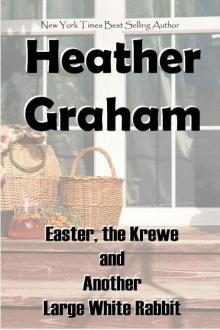 Easter, the Krewe and Another Large White Rabbit
Easter, the Krewe and Another Large White Rabbit Haunted
Haunted The Silenced
The Silenced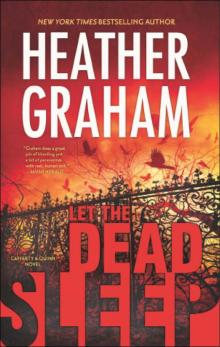 Let the Dead Sleep
Let the Dead Sleep Christmas, the Krewe, and Kenneth
Christmas, the Krewe, and Kenneth Big Easy Evil
Big Easy Evil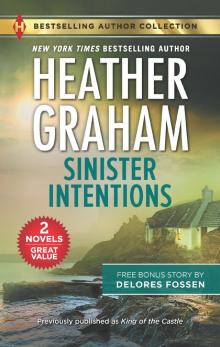 Sinister Intentions & Confiscated Conception
Sinister Intentions & Confiscated Conception Haunted Be the Holidays: A Krewe of Hunters Novella
Haunted Be the Holidays: A Krewe of Hunters Novella Blood Red
Blood Red A Perilous Eden
A Perilous Eden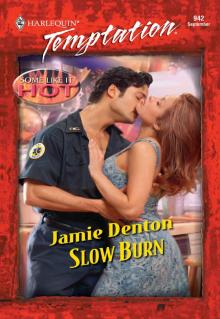 Slow Burn
Slow Burn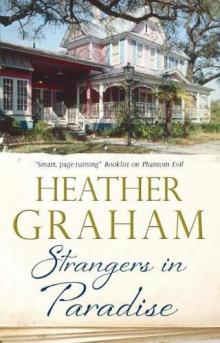 Strangers In Paradise
Strangers In Paradise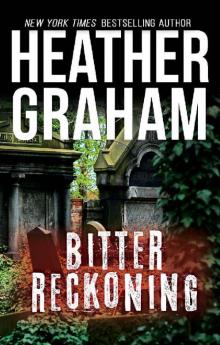 Bitter Reckoning
Bitter Reckoning Krewe of Hunters, Volume 1: Phantom Evil ; Heart of Evil ; Sacred Evil ; The Evil Inside
Krewe of Hunters, Volume 1: Phantom Evil ; Heart of Evil ; Sacred Evil ; The Evil Inside Do You Fear What I Fear?
Do You Fear What I Fear? The Face in the Window
The Face in the Window Krewe of Hunters, Volume 3: The Night Is WatchingThe Night Is AliveThe Night Is Forever
Krewe of Hunters, Volume 3: The Night Is WatchingThe Night Is AliveThe Night Is Forever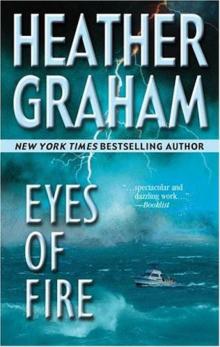 Eyes of Fire
Eyes of Fire Apache Summer sb-3
Apache Summer sb-3 Sensuous Angel
Sensuous Angel In the Dark
In the Dark Knight Triumphant
Knight Triumphant Hours to Cherish
Hours to Cherish Tender Deception
Tender Deception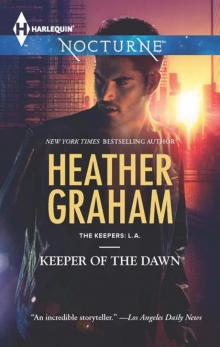 Keeper of the Dawn tkl-4
Keeper of the Dawn tkl-4 Apache Summer
Apache Summer Between Roc and a Hard Place
Between Roc and a Hard Place Echoes of Evil
Echoes of Evil The Game of Love
The Game of Love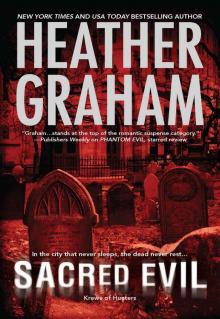 Sacred Evil (Krewe of Hunters)
Sacred Evil (Krewe of Hunters) Bougainvillea
Bougainvillea Tender Taming
Tender Taming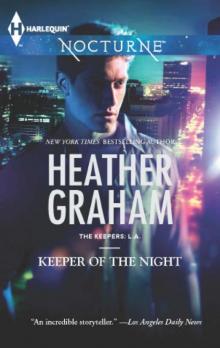 Keeper of the Night (The Keepers: L.A.)
Keeper of the Night (The Keepers: L.A.) Lonesome Rider and Wilde Imaginings
Lonesome Rider and Wilde Imaginings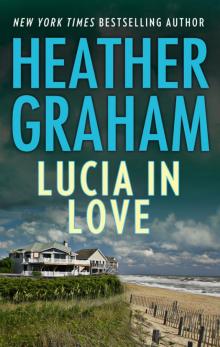 Lucia in Love
Lucia in Love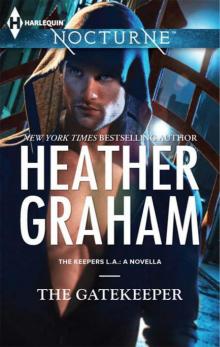 The Gatekeeper
The Gatekeeper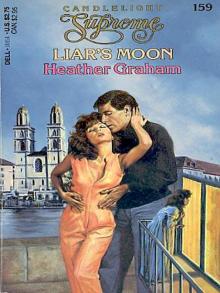 Liar's Moon
Liar's Moon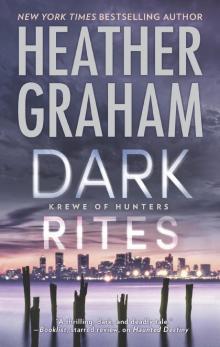 Dark Rites--A Paranormal Romance Novel
Dark Rites--A Paranormal Romance Novel A Season for Love
A Season for Love Krewe of Hunters, Volume 6: Haunted Destiny ; Deadly Fate ; Darkest Journey
Krewe of Hunters, Volume 6: Haunted Destiny ; Deadly Fate ; Darkest Journey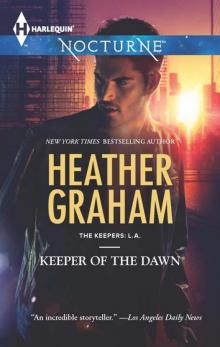 Keeper of the Dawn (The Keepers: L.A.)
Keeper of the Dawn (The Keepers: L.A.)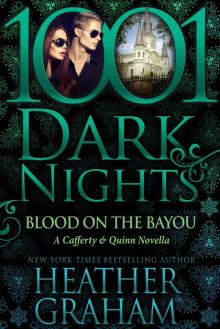 Blood on the Bayou: A Cafferty & Quinn Novella
Blood on the Bayou: A Cafferty & Quinn Novella Double Entendre
Double Entendre A Perfect Obsession--A Novel of Romantic Suspense
A Perfect Obsession--A Novel of Romantic Suspense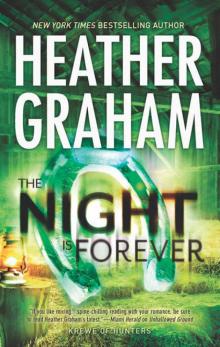 The Night Is Forever koh-11
The Night Is Forever koh-11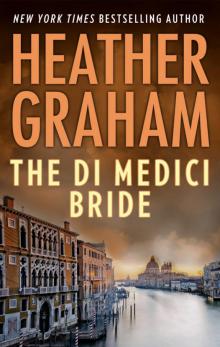 The Di Medici Bride
The Di Medici Bride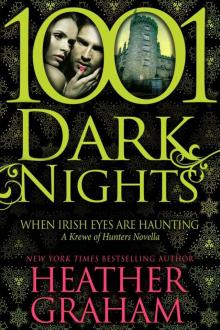 When Irish Eyes Are Haunting: A Krewe of Hunters Novella
When Irish Eyes Are Haunting: A Krewe of Hunters Novella The Keepers: Christmas in Salem: Do You Fear What I Fear?The Fright Before ChristmasUnholy NightStalking in a Winter Wonderland (Harlequin Nocturne)
The Keepers: Christmas in Salem: Do You Fear What I Fear?The Fright Before ChristmasUnholy NightStalking in a Winter Wonderland (Harlequin Nocturne) Never Fear
Never Fear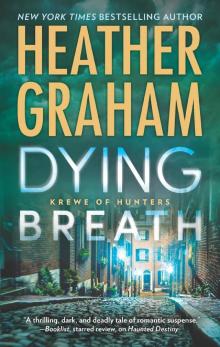 Dying Breath--A Heart-Stopping Novel of Paranormal Romantic Suspense
Dying Breath--A Heart-Stopping Novel of Paranormal Romantic Suspense If Looks Could Kill
If Looks Could Kill This Rough Magic
This Rough Magic Heather Graham's Christmas Treasures
Heather Graham's Christmas Treasures Hatfield and McCoy
Hatfield and McCoy The Trouble with Andrew
The Trouble with Andrew Never Fear - The Tarot: Do You Really Want To Know?
Never Fear - The Tarot: Do You Really Want To Know?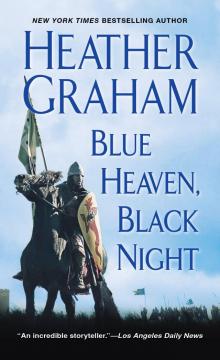 Blue Heaven, Black Night
Blue Heaven, Black Night Forbidden Fire
Forbidden Fire Come the Morning
Come the Morning Dark Stranger sb-4
Dark Stranger sb-4 Lie Down in Roses
Lie Down in Roses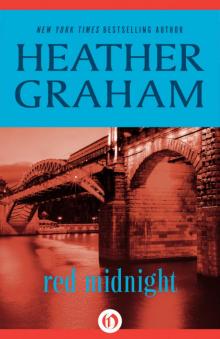 Red Midnight
Red Midnight Krewe of Hunters Series, Volume 5
Krewe of Hunters Series, Volume 5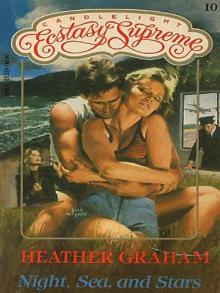 Night, Sea, And Stars
Night, Sea, And Stars Snowfire
Snowfire Quiet Walks the Tiger
Quiet Walks the Tiger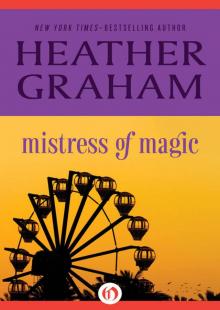 Mistress of Magic
Mistress of Magic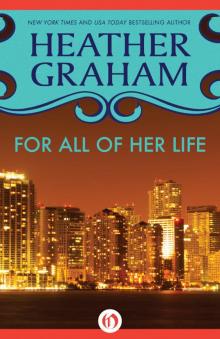 For All of Her Life
For All of Her Life Runaway
Runaway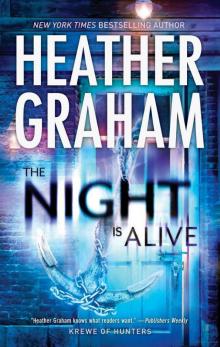 The Night Is Alive koh-10
The Night Is Alive koh-10 The Evil Inside (Krewe of Hunters)
The Evil Inside (Krewe of Hunters)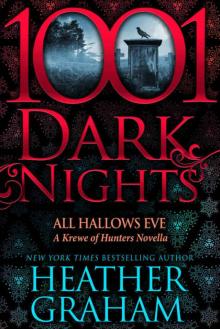 All Hallows Eve: A Krewe of Hunters Novella (1001 Dark Nights)
All Hallows Eve: A Krewe of Hunters Novella (1001 Dark Nights) Tomorrow the Glory
Tomorrow the Glory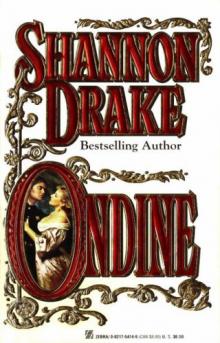 Ondine
Ondine Angel of Mercy & Standoff at Mustang Ridge
Angel of Mercy & Standoff at Mustang Ridge Bride of the Tiger
Bride of the Tiger When Next We Love
When Next We Love Heather Graham Krewe of Hunters Series, Volume 4
Heather Graham Krewe of Hunters Series, Volume 4 A Season of Miracles
A Season of Miracles Realm of Shadows (Vampire Alliance)
Realm of Shadows (Vampire Alliance) When We Touch
When We Touch Serena's Magic
Serena's Magic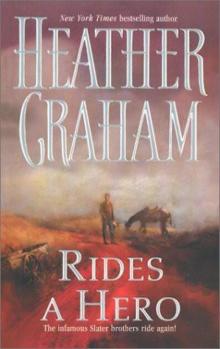 Rides a Hero sb-2
Rides a Hero sb-2 All in the Family
All in the Family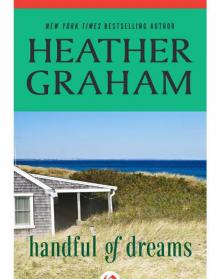 Handful of Dreams
Handful of Dreams A Stranger in the Hamptons
A Stranger in the Hamptons Krewe of Hunters, Volume 2: The Unseen ; The Unholy ; The Unspoken ; The Uninvited
Krewe of Hunters, Volume 2: The Unseen ; The Unholy ; The Unspoken ; The Uninvited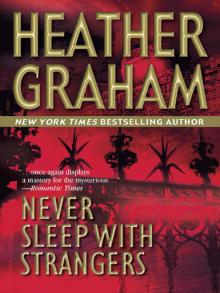 Never Sleep With Strangers
Never Sleep With Strangers Eden's Spell
Eden's Spell A Magical Christmas
A Magical Christmas Forever My Love
Forever My Love King of the Castle
King of the Castle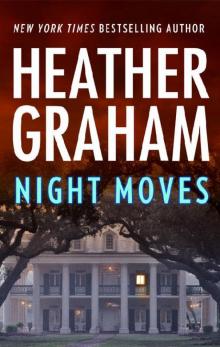 Night Moves (60th Anniversary)
Night Moves (60th Anniversary) The Island
The Island Borrowed Angel
Borrowed Angel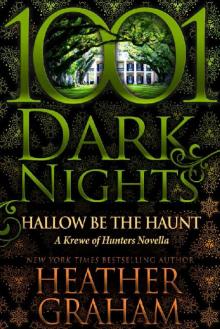 Hallow Be the Haunt: A Krewe of Hunters Novella
Hallow Be the Haunt: A Krewe of Hunters Novella Why I Love New Orleans
Why I Love New Orleans The Last Cavalier
The Last Cavalier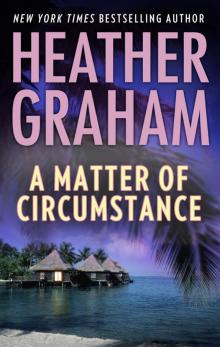 A Matter of Circumstance
A Matter of Circumstance Heather Graham's Haunted Treasures
Heather Graham's Haunted Treasures Tempestuous Eden
Tempestuous Eden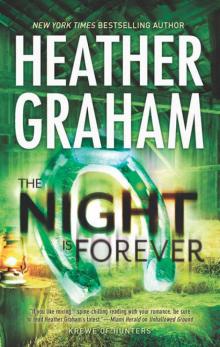 Krewe 11 - The Night Is Forever
Krewe 11 - The Night Is Forever